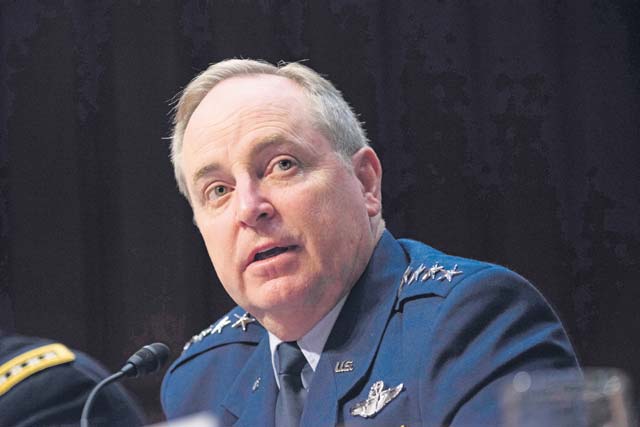
Chief of Staff of the Air Force Gen. Mark A. Welsh III attends the Senate Armed Services Committee on Department of Defense proposals relating to military compensation May 6 in Washington, D.C. He was joined by the 18th Chairman of the Joint Chiefs of Staff Gen. Martin E. Dempsey, Vice Chairman of the Joint Chiefs of Staff Adm. James A. Winnefeld Jr., Chief of Staff of the Army Gen. Raymond T. Odierno, Chief of Naval Operations Adm. Jonathan W. Greenert, Commandant of the Marine Corps Gen. James F. Amos, and Chief of the National Guard Bureau Gen. Frank J. Grass.
WASHINGTON — After 23 years of high-tempo operations, the Air Force is in a precarious position, Air Force Chief of Staff Gen. Mark A. Welsh III told the Senate Armed Services Committee May 6.
The general was joined in his testimony by his fellow members of the Joint Chiefs of Staff, including the Joint Chiefs chairman, Army Gen. Martin E. Dempsey, and the vice chairman, Navy Adm. James A. “Sandy” Winnefeld Jr.
Airmen have performed spectacularly well over a period that included numerous routine deployments and contingency responses, Welsh said.
“I believe they’ve earned every penny they’ve made,” the general added. But per-capita costs for Airmen have grown more than 40 percent since 2000, he noted.
“Last year, our readiness levels reached an all-time low,” Welsh said. “As we struggle to recover, we don’t have enough units ready to respond immediately to a major contingency, and we’re not always able to provide fully mission-ready units to meet our combatant commanders’ routine rotational requirements.”
The Air Force’s modernization forecasts also are bleak, the general said. About 20 percent of its aircraft flying today were built in the 1950s and 1960s, he noted, and more than half of the rest are 25 years old or older.
“And now, due to sequestration, we’ve cut about 50 percent of our currently planned modernization programs,” Welsh said.
The fiscal situation has forced the Air Force into some very difficult decisions, the general said, particularly in the area of pay and compensation reform.
“No one takes this lightly,” he said, “but we feel it’s necessary to at least try and create some savings.”
Without these tough calls, the Air Force “will be neither ready to fight today, nor viable against the threats of tomorrow,” Welsh said.
Slowing the rate of pay increases, gradually reducing housing pay, reforming the TRICARE health care plan and reducing commissary subsidies will certainly hurt, the general said. But, he added, “what my secretary and I owe the nation, the joint team and our Airmen, more than anything else, are the training and tools necessary to fight and win and survive.”
If Congress fails to pass the proposed compensation reforms, the Air Force will be forced to cut $8.1 billion from readiness, modernization and infrastructure accounts over the next five years, Welsh said.
“We’ll take significant cuts to flying hours and weapons system sustainment accounts, reduce precision munitions buys, and lower funding for training ranges, digging our readiness hole even deeper,” the general said.
“We’ll likely have to cancel or delay several critical recapitalization programs,” he continued. “Among those probably impacted would be the combat rescue helicopter and the TX trainer. Abandoning the TX program would mean that future pilots will then continue to train in the 50-year-old T-38. We’ll also be forced to cut spending on infrastructure beyond the $5 billion we’ve already recommended to cut over (the next five years).”
These cuts would come in addition to the recommendations the Air Force already made, Welsh emphasized, including decreasing its force strength by nearly 17,000 Airmen next year, divesting the entire A-10 Thunderbolt II and U-2 reconnaissance aircraft fleets and possibly divesting the KC-10 Extender fleet.
“None of these options are good ones, but we are simply out of good options,” he said. “It’s time for courageous leadership. We simply can’t continue to defer every tough decision in the near term, at the expense of military readiness and capability over time.”


